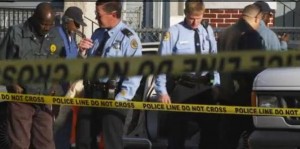Trying to Stop the Violence
Posted on by Townsend Myers
My twitter feed is blowing up:
“Cops working several shootings in city at moment 1) Shooting Claiborne/Carrollton 2) Triple shooting on Elysian Fields 3) 1300 blk Columbus”
“Nelson elementary in Gentilly on lockdown as cops search for gunman. At least one suspect fired gunshots. Three suspects in custody”
“For those asking, we have 11 murders over first 12 days of this year — not including man fatally shot by cops today.”
Brendan McCarthy, crime reporter for the Times Picayune, is tweeting the pulse of New Orleans moment by moment, and the words on the screen of my iPhone are not looking good. We’ve got a problem, New Orleans.
Sure, it’s easy to call it a crime problem – but I’m not talking about a crime problem – I’m talking about a fixing problem.
At the beginning of this year, The Atlantic did a photos essay/article, “Patrolling the Streets of New Orleans at Night.” A photographer accompanies a young policeman on a ride-along, to see what the NOPD are doing about violent crime. The cop featured in the story is 23-year old David DeSalvo. Viewing the photos and seeing what he sees nightly is a sobering experience. This is not the land-of-dreams New Orleans. This is not the recovering, rebounding, rejoicing New Orleans that we tout to the nation and the world.
A new documentary is coming out that shows the staggering toll of violence in New Orleans: Shell Shocked: The New Orleans Youth Story. The filmmaker, John Richie, told WWL News that they didn’t meet one African-American youth who had not been touched in some way by violent crime to themselves or someone they know — a sad commentary on the dire situation at hand, indeed. (See WWL article)
The city’s leaders aren’t sure what to do. Mayor Landrieu formed SOS NOLA, an anti-violence initiative, and holds press conferences with Serpas whenever there is an overnight spike. Our D.A. touts his track record of accepting more and more criminal cases, and taking more and more of those cases to trial.
I am a criminal defense attorney. I spend time in the trenches defending these cases. When crime gets bad, and the powers-that-be start to respond, I get phone calls – I get cases. Right now my phone is ringing off the hook, and I’m in court more often than not faced with an offender looking at a D.A. hell bent on making a point. Sounds great right? Bad guys being called to task.
The problem for the citizens of this great city is that the people calling me aren’t the bad guys – they are college kids and tourists being hassled by NOPD and prosecuted by the D.A. for relatively minor violations. Sure, some bad guys are still getting arrested and prosecuted, but the vast majority of criminal prosecutions – touted as “the answer” to the crime problem – are for relatively minor, non-violent crimes. They have no effect on the real problem.
Remember back in 2010 that the New Orleans City Council voted unanimously to designate marijuana possession a municipal offense, allowing police an option to issue a summons rather than make an arrest. The intention behind the change was that NOPD would have more time to deal with major crimes. Remember that? But here it is, 2012. Hundreds of kids are being hauled into court for marijuana possession, but the murder rate is still spiraling out of control.
The other prosecution du jour – Minors in Possession of Alcohol – a real public menace, right? In the fall of 2010 the NOPD received a grant to begin stepped-up enforcement of this crime. Since then, literally thousands of kids have been stopped by NOPD and prosecuted by the City for this charge.
We need more resources and more cops on the beat of David DeSalvo, beating a path in the city’s most violent neighborhoods, taking guns off the streets and out of the hands of our children. We need to spend our time and resources prosecuting bad guys, not pot heads and underage drinkers. Until we can properly identify and commit to solving the real crime problem, our efforts will have no real effect. As long as we continue to believe that prosecuting more “crime” can solve the problem, the longer we will continue to avoid fixing the real crime problem.












